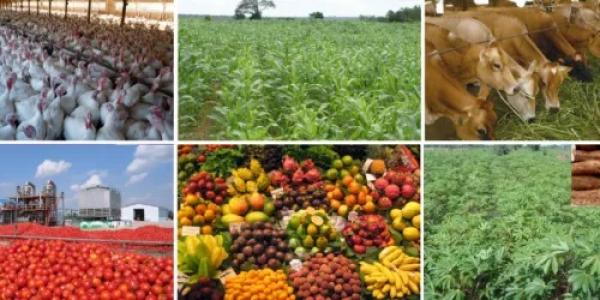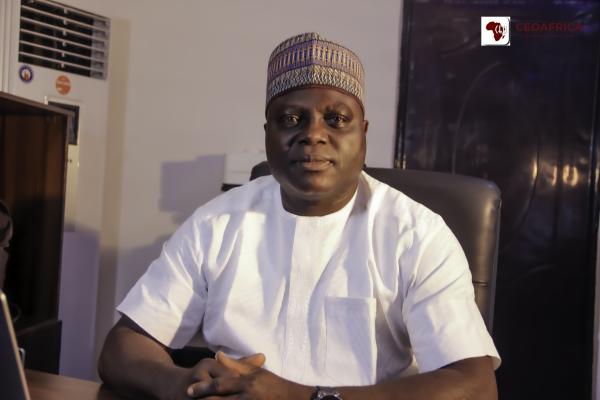
Friday, 4th June 2021: The Head of Department Agri-Business Management, Federal College of Animal Health and Production Technology, (FCAH&PT), Moor Plantation, Ibadan, Dr. Ibrahim Abdulgani, said until when Agriculture is taken as a business in Nigeria that the multi-faceted security problem of the country would be solved.
He stated this during an exclusive interview with CEOAFRICA at the Agribusiness Management programme organized by the college in collaboration with the International Center for Development Oriented Research in Agriculture, (ICRA).
According to Abdulgani, the department of Agribusiness is just taking off in the college and the first academic session is set to begin soon.
“Presently, we are recruiting our first batch of students into the department. Anytime from now, we will begin to turn out students, so we are ceasing this opportunity to let the public know that a department of Agribusiness have been established, and it is first of its kind in the whole country.
“The college spearheaded the development of the curriculum with some other colleges of Agriculture and the curriculum has been approved by NBTE, and we have been given the go ahead to begin to admit students at the Higher National Diploma level.
“Now, as part of our decision at the department to ensure teaching of Agribusiness Management aside from the normal class room teaching, we want students to see Agribusiness in the real practical sense of it.
“Agribusiness comprise of Agriculture which is the production activities, and business which involves marketing of products. There are four aspects of Agriculture which are; the input supply, production, processing and marketing.
“What we have been doing over the years is to emphasize on input supply and production in most cases, the aspect of value addition has been lacking. We only produce, we do not add value and we do not also explore the market, and that is why a lot of people do not really have interest in Agriculture.
“Nobody will have a child today and will want that child to study Agriculture but you can see in the developing countries because of the way they have taken Agriculture as a business it has become a veritable venture.
“We want to ensure that this time around, we actually take Agriculture as a business, this will solve a lot of problems not even within our immediate environment but in the country at large.
“We can see the high rate of unemployment in the country. We can see the problem of food insecurity; we can even see the problem of insecurity of lives and properties especially among our youths.
“All these things is a result of our youths leaving schools without jobs and no doubt about it, agriculture is the main stay of this economy. It is only when we go back to agriculture that we can solve so many of these problems and the only way we can do that is to take agriculture as a business.
“Now that we have the departments, we want to teach our students the practical aspect of Agribusiness and that is what brought about our collaboration with ICRA because we believe that collaborating with them under this program which we have tagged Agri-Business Cluster (ABC) for education; we will be able to achieve most of these objectives that I have highlighted.”
Abdulgani stated that the beneficiaries of the initiative will not be limited to the students of the institution alone; it is a prospect that is open to everyone.
“We call it an Agribusiness cluster, the reason why we brought in education is because it is happening in an educational institution and our students will also be beneficiaries of this arrangement.
“More importantly, the cluster is an aggregation of actors that may not necessarily be within the college environment, we are talking about actors in a particular commodity.
“Let us take for instance, if we are talking about Cassava farmers, of course we will have Cassava producers, we will have those who will process Cassava, we will have transporters, we will also have processors and we will have marketers, all these people are actors.
“We bring them into that cluster and our arrangement with ICRA in Netherlands is for them to provide the technical support on how to run these clusters.
“We bring them together, so that they will be able to do their business in order for them to make more money, in order for them to make better profits and remain in business.
“There are quite a lot of problems, our farmers are facing today, some produce and sell at a loss they will not even be able to recover their cost of production.
“A lot will not be able to process. I have seen a case where someone produces and by the time he took his product to the market he was able to sell just at the rate he was able to only recover the cost of transportation. Will that farmer remain in business?
“But by the time we are able to bring all of them together, all the major actors, they will have what we call a coach, that coach will be the head of the cluster.
“We as an institution in collaboration with ICRA will always provide the enabling environment for that cluster to achieve their aims and objectives for everybody within the cluster to benefit in terms of improved income, increased income, improved livelihood and more employment.
“And we will become food secured. As an institution, our students will benefit and we will also benefit because along the line, research will be involved.
“We will also benefit in terms of research and development, students will be able to benefit in terms of teaching Agribusiness in the practical sense of it.
“Formation of clusters involves different actors or stakeholders, but as a college or as a department in a college we are the background to manage those clusters. Of course in the process of managing the clusters, income also comes to the college.
“Not even only to the college, income also goes to ICRA because we are the two partnering bodies that will be managing this cluster.
“By the time those who are in the cluster make more money, they are not making money for themselves alone, they are also making money for those of us that are providing the technical support and the managerial support that is giving them all the guidance for that cluster to work so that at the end of the day, it becomes a kind of benefit in terms of income.
“As it is bringing income to the actors within the cluster so also, it is generating income not only for the department but also for the college and for ICRA.”


















